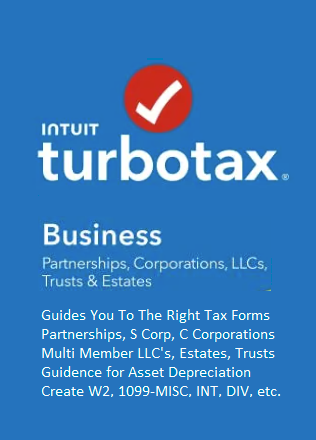TurboTax Business Tax Filing Software
TurboTax Business
>> learn more

Software Download / CD >
Turbo Tax Business Software Provides the Right Choice to Complete Business Tax Filing
- Partnerships (Form 1065)
- Multi-Member LLCs (Form 1065)
- C Corporations (Form 1120)
- S Corporations (Form 1120S)
- Estates and Trusts (Form 1041)
TurboTax Business works best if your small business:
- Has revenue of less than $250,000
- Has fewer than five employees
 It’s
easier than ever to prepare and file your business tax return on your schedule,
and save some serous cash on tax preparation fees at the same time.
It’s
easier than ever to prepare and file your business tax return on your schedule,
and save some serous cash on tax preparation fees at the same time.
You don’t need to know a thing about business tax preparation with the TurboTax Business Edition as the interview tailors itself to your type of business (corporation, partnership, or multi-member LLC). It then provides extra guidance to help help you easily maximize tax savings.
- Creates K-1 Forms and distribute them electronically in PDF format
- Creates Unlimited W-2, 1099-MISC, 1099-INT and 1099-DIV Forms. Prepare forms for employees, contractors, shareholders and partners
- Import of Profit & Loss statements from QuickBooks income and expense accounts and classifies them in the appropriate tax categories
- Multiple Businesses Filing, Helps you prepare returns for multiple entity businesses types.
- Provides Extra Guidance for New Businesses, See what start-up costs you can deduct.
- TurboTax streamlines data entry for profit & Loss statements so you can quickly enter all your income and expenses. TurboTax guidance helps cover all income and expense categories.
- TurboTax Business transfers your federal data to TurboTax State so you can complete your state return easily with full accuracy.
- Guides you step-by-step with Real Estate Rental Property Activities
The TurboTax Business Edition helps you deduct expenses like:
- Vehicle Expenses: See if you will get a bigger refund using actual expenses or the standard mileage deduction. Split vehicle expenses between personal and business use.
- Office Supplies including paper, ink, postage stamps, staples, CDs, and more.
- Helps you depreciate items that can't be written off in one year.
- Promotion and Advertising: Deduct expenses like brochures, business cards, web sites
- Travel: Determin what you can deduct for meals, taxis, hotels, airfare and more.
- Identifies Industry-Specific Deductions to help you spot commonly overlooked deductions.
Get TurboTax Business Expert Help Along the Way: TurboTax CPAs, EAs and Tax Attorneys are available year-round to answer any questions and provide guidance.
Business tax filing can be a challenge with all the confusing tax laws our government drums up to mess with small businesses and self employed tax filers. Here's some tips for business tax filing.
- Keep good records: Proper record-keeping year-round will ensure you have the paperwork you need to prepare your return as well as back up your return once its filed.
- Understand your deductions: Know what small business deductions can you take as tax credits and deductions change from year to year.
- Utilize the Small Business Jobs Act of 2010 with 17 tax provisions decreasing the tax burdens for small businesses. These provisions can provide great savings for business tax filing.
- Tax credits within the Affordable Care Act will allow small businesses to cover up to 35 percent of the premiums a small business pays to cover its workers.
TurboTax Business tax software helps you Avoid common audit traps as it alerts you to red flag audit trigger entries. It is very important to be aware of red flags and act on them before the IRS does: Some of these entries can include:
- Home office deduction: This deduction is very specific and you should be aware of how to determine if you are eligible to claim it, and what specific expenses you can write off.
- Classifying employees as independent contractors: It's important to understand the difference between employees and independent contractors as they are not the same, and. In the eyes of the IRS, misclassification may be looked at as an attempt to avoid paying payroll taxes.
- Large miscellaneous deductions: Claiming large amounts of itemized deductions relative to your income may be suspicious. Be specific and label every deduction.
- Keep personal and business expenses separate. The IRS makes a point of discovering personal expenses that may have been claimed as a business expense. Be diligent about keeping separate bank and credit card accounts for your business and personal activities.